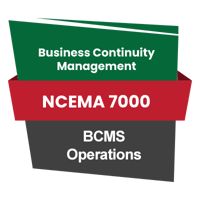Chapter 7: Document Information
| Disclaimer |  |
Click the "NCEMA 7000 Simplified" icon to read the detailed "Disclaimer" and "Usage of this Content." | |
| Proper Usage of Guidebook | |||
Document Information: Guidelines on The National Standard for BCMS (Specifications)

 The NCEMA 7000 guidelines provide a comprehensive framework for managing documented information within a Business Continuity Management System (BCMS).
The NCEMA 7000 guidelines provide a comprehensive framework for managing documented information within a Business Continuity Management System (BCMS).
These guidelines recognise the critical role of documented information in maintaining operational consistency, accountability, and compliance and emphasise the importance of crafting clear and concise procedures.
Organisations can ensure that their documentation enhances operational efficiency and aligns with management system requirements by detailing inputs, outputs, and expected results. The accessibility and clarity of this information are paramount, allowing stakeholders to locate and understand necessary documents easily, regardless of the format used.
Furthermore, the guidelines highlight best practices for creating and controlling documented information. Organisations are urged to implement robust processes for document identification, selection of appropriate media, version control, distribution, access rights, and secure storage.
These guidelines lay the groundwork for a resilient BCMS by establishing minimum documentation requirements, such as defining roles and responsibilities, articulating risk attitudes, and outlining policies and objectives.
This structured approach enables organisations to demonstrate their readiness for continuity and effective risk management while ensuring that their documentation evolves in response to changing business objectives and regulatory demands.
Below is an outline of the key elements and structure of this vital standard:
Purpose and Scope
The guidelines aim to:
- Provide a unified approach to BCM within the UAE.
- Ensure the resilience of organisations across various sectors against crises, emergencies, and disasters.
- Establish clear and actionable requirements for implementing, maintaining, and improving a Business Continuity Management System (BCMS).
The scope covers all public and private sector entities operating within the UAE, emphasising adaptability to these organisations' specific operational and regulatory environments.
Structure of the Document
The NCEMA 7000:2021 standard is divided into several critical sections that collectively ensure a comprehensive BCM framework:
A. Introduction
The introduction to NCEMA 7000:2021 sets the stage for its significance in the UAE's resilience landscape. It articulates the necessity of proactive planning and preparedness in addressing a wide array of potential disruptions, from natural disasters to man-made crises.
This foundational section highlights the UAE’s commitment to safeguarding its economic, social, and operational stability through a well-defined and standardised approach to BCM.
A key aspect of the introduction is its focus on creating a resilient nation. By underscoring the interplay between organisational stability and national security, the guidelines emphasise how a strong BCM framework contributes to the broader goals of the UAE’s vision for sustainable development and crisis readiness. The document reflects NCEMA's strategic foresight in fostering a culture of resilience across the public and private sectors.
Moreover, the introduction acknowledges the diversity of organisations within the UAE and the need for a tailored approach to BCM. It encourages entities of all sizes and industries to adopt the principles and practices outlined in the standard, ensuring that resilience is not just a regulatory obligation but a core component of operational excellence.
This section calls on organisations to prioritise BCM planning as a vital part of their strategic objectives.
B. Terms and Definitions
The document provides detailed definitions of terms commonly used in BCM to ensure clarity and consistency. This establishes a common understanding among stakeholders implementing the standard.
C. Principles of Business Continuity
Key principles include:
- Risk-based approach: Identifying and mitigating potential disruptions.
- Continuous improvement: Regular updates and enhancements to the BCMS.
- Stakeholder involvement: Engaging all relevant parties in the planning and implementation process.
D. Requirements of the BCMS
This core section details the mandatory components of a robust BCMS:
- Leadership and Commitment: Senior management’s active involvement is critical for successful implementation.
- Context of the Organisation: Understanding the internal and external factors influencing BCM.
- Risk Analysis and Review (RAR) and Business Impact Analysis (BIA): Identifying threats and assessing their potential impact on organisational objectives.
- BCM Strategies: Developing actionable plans to manage identified risks.
- Training and Awareness: Building a culture of resilience through regular training and communication.
E. Documentation and Recordkeeping
The guidelines specify the need for meticulous documentation to support the implementation and monitoring of the BCMS. Key documents include:
- Business Continuity Plans
- Incident Response Plans
- Testing and Exercising Records
- Audit and Review Reports
F. Testing, Maintenance, and Review
A robust BCMS must be tested regularly to ensure effectiveness. This section emphasizes:
- Conducting simulations and drills.
- Periodic reviews and updates to align with evolving risks and organisational changes.
G. Compliance and Certification
Organisations must demonstrate adherence to the NCEMA 7000:2021 standards through audits and certifications. This establishes credibility and assures stakeholders of the organisation’s commitment to resilience.
Benefits of Implementing NCEMA 7000:2021
organisations that adhere to the NCEMA guidelines can:
- Enhance their ability to respond effectively to disruptions.
- Minimise downtime and financial losses during crises.
- Strengthen stakeholder confidence and trust.
- Comply with UAE’s legal and regulatory requirements.
Summing Up ...
The NCEMA 7000:2021 is a pivotal framework for enhancing organisational resilience in an era of increasing uncertainties. Its implementation ensures that organisations can effectively manage disruptions, safeguarding their operations and stakeholders.
By embedding the principles of this standard into their practices, organisations demonstrate a proactive commitment to preparedness and sustainability.
This standard underscores the UAE's visionary approach to crisis management, linking organisational resilience to national stability. It empowers entities to align with global best practices while addressing the unique challenges of their operational and regulatory environments.
The emphasis on leadership involvement, stakeholder engagement, and continuous improvement fosters a robust culture of readiness across all sectors.
Ultimately, the NCEMA 7000:2021 is more than a guideline; it is a strategic enabler for achieving operational excellence. Through rigorous adherence to its principles, organisations contribute to the UAE's overarching mission of resilience and stability, ensuring they thrive despite adversity.
|
Business Continuity Management Series: UAE National Emergency Crisis and Disaster Management Authority (NCEMA) 7000 |
||||
 |
 |
 |
 |
 |
 |
 |
 |
 |
 |
More Information About Business Continuity Management Courses

 To learn more about the course and schedule, click the buttons below for the BCM-300 Business Continuity Management Implementer [B-3] course and the BCM-5000 Business Continuity Management Expert Implementer [B-5].
To learn more about the course and schedule, click the buttons below for the BCM-300 Business Continuity Management Implementer [B-3] course and the BCM-5000 Business Continuity Management Expert Implementer [B-5].
![Register [BL-B-3]*](https://no-cache.hubspot.com/cta/default/3893111/ac6cf073-4cdd-4541-91ed-889f731d5076.png) |
 |
 |
 |
 |
 |
![FAQ [BL-B-3]](https://no-cache.hubspot.com/cta/default/3893111/b3824ba1-7aa1-4eb6-bef8-94f57121c5ae.png) |
If you have any questions, click to contact us.
|
 |
 |
 |
 |


![Email to Sales Team [BCM Institute]](https://no-cache.hubspot.com/cta/default/3893111/3c53daeb-2836-4843-b0e0-645baee2ab9e.png)

